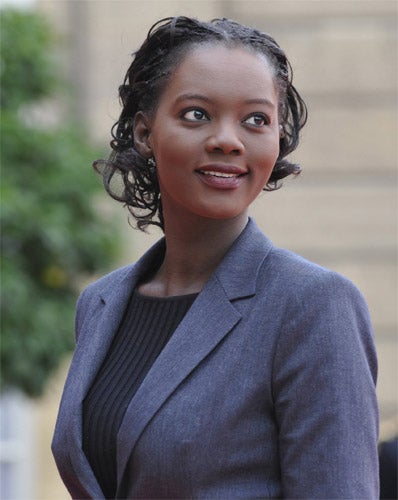Sarkozy sidelines young black cabinet minister
First overtly gay politician is appointed to head French department of culture

President Nicolas Sarkozy announced a larger than expected government reshuffle last night, sidelining his emblematic, young black minister Rama Yade and giving France its first overtly gay cabinet minister.
Six ministers were fired and two departed for the European Parliament, including the controversial justice minister, Rachida Dati. The most prominent casualties were the culture minister, Christine Albanel, dumped for failing to deliver a law on illegal internet downloading, and the former France rugby team coach, Bernard Laporte, dropped to make way for Mme Yade's humiliating, sideways move from human rights to sport.
President Sarkozy had hoped to anger his political opposition by capturing another left-wing minister as part of his policy of political and racial "ouverture". In the end, he had to settle for recruiting a celebrated, left-wing name, but not a politician.
The film-maker, writer and TV presenter Frédéric Mitterrand, 61, nephew of the late President François Mitterrand, will become culture minister, a very high-profile job in France. This appointment, welcomed by many in the artistic world, will irritate the Catholic, conservative right. M. Mitterrand is a vociferous campaigner for homosexual rights and a columnist in the gay magazine, Tétu.
The reshuffle left most major posts, including Prime Minister François Fillon, foreign minister Bernard Kouchner and finance minister Christine Lagarde, untouched. The interior minister, Michèle Alliot-Marie moves to justice to replace Mme Dati. She is replaced at the politically sensitive interior ministry by a Sarkozy childhood friend and loyalist, Brice Hortefeux.
President Sarkozy also took the opportunity to settle a few scores and punish ministers who had defied or disappointed him. Rama Yade, 32, the strikingly beautiful, Senegalese-born junior foreign minister for human rights, was one of the great symbols of M. Sarkozy's "ouverture" to racial minorities, women and youth when she was first appointed in 2007. She has since angered the President by taking an independent line on Libya and China and refusing to be sent into internal exile to the European Parliament.
So much symbolism was heaped on Mme Yade's appointment, and her personal popularity is so great, that the president dared not fire her outright. The move to sport – and the abolition of her old human rights job – will however be interpreted as a punishment.
With Mme Dati also leaving the cabinet in semi-disgrace, the Sarkozy experiment with positive discrimination in ministerial office has come to a rapid and unfortunate conclusion. Mme Dati's departure had been ordained since February when she agreed, reluctantly, to run in the European Parliament elections.
Socialist politicians crowed last night that the President's policy of party-political "ouverture" was also over. Michel Sapin, a leading member of the Parti Socialiste, said the President had been forced "to play with family names" because he could not attract any more defectors from the Left.
The firing of Bernard Laporte, the former France rugby coach, is equally a setback for M. Sarkozy's policy of ignoring deserving claimants in his own centre-right party and reaching out to non-politicians. M. Laporte is generally agreed to have been a failure as sports minister.
The new government marks a return to the more normal spoils system with the promotion of several centre-right politicians who felt badly treated when ignored in 2007. The most obvious example is the parliamentarian, Pierre Lellouche, who regards himself as a great expert on international affairs. He was overlooked two years ago but is promoted to Europe minister.
President Sarkozy and M. Fillon had been forecast to make only minor changes after a relatively good showing for their centre-right party, the Union pour un Mouvement Populaire (UMP), in the European elections. Other changes included the appointment of the centrist, Michel Mercier as agriculture minister, replacing Michel Barnier who goes to the European Parliament. Xavier Darcos moves from education to work and social relations, replaced by the government spokesman, Luc Chatel.
Join our commenting forum
Join thought-provoking conversations, follow other Independent readers and see their replies
Comments
Bookmark popover
Removed from bookmarks